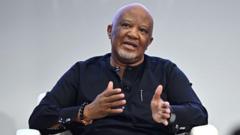Thousands of individuals participating in clinical trials are now left in precarious situations following the Trump Administration's financial halt to U.S.A.I.D. projects, substantially affecting healthcare and safety worldwide.
Abandoned Clinical Trials: The Impact of Trump Administration Orders

Abandoned Clinical Trials: The Impact of Trump Administration Orders
An abrupt cessation of U.S.A.I.D.-funded clinical trials leaves participants without medical support.
Asanda Zondi, a 22-year-old South African, received alarming news last Thursday while participating in a clinical study aimed at preventing pregnancy and HIV infection. She was instructed to go to a clinic in Vulindlela for the immediate removal of a silicone device that had been inserted as part of the trial. The cancellation of the trial was attributed to a stop-work order issued by the U.S. Agency for International Development (U.S.A.I.D.), which had been ordered to cease funding following an executive directive from President Trump to freeze all foreign aid for a minimum of 90 days.
Zondi's situation highlights the growing disarray following the government's decision, impacting not just her but numerous others involved in various global trials, effectively leaving them isolated from crucial medical oversight. Since the executive order, a wave of disquiet and mistrust has swept over participants unsure about the risks of leaving experimental drugs and devices in their bodies without proper monitoring or care.
This freeze on funding has led to a significant administrative shift; crucial information on U.S.A.I.D. operations has been stripped from its website, as most permanent employees have been placed on administrative leave. Secretary of State Marco Rubio has voiced criticisms against the agency, labeling it as inefficient and aligned with a liberal agenda, which has raised concerns about the future of foreign aid initiatives.
Researchers caught in this predicament are now faced with a moral quandary, as they are restricted by the stop-work order from engaging with their trial volunteers. The ethical dilemma presents itself starkly: whether to violate governmental orders to continue offering necessary care to participants or to step back, leading to potentially harmful outcomes for those already in vulnerable positions.
The multi-faceted implications of these policy decisions underline a larger conversation on healthcare access, the handling of experimental trials, and the ethical responsibilities of governmental agencies toward global health initiatives.
Zondi's situation highlights the growing disarray following the government's decision, impacting not just her but numerous others involved in various global trials, effectively leaving them isolated from crucial medical oversight. Since the executive order, a wave of disquiet and mistrust has swept over participants unsure about the risks of leaving experimental drugs and devices in their bodies without proper monitoring or care.
This freeze on funding has led to a significant administrative shift; crucial information on U.S.A.I.D. operations has been stripped from its website, as most permanent employees have been placed on administrative leave. Secretary of State Marco Rubio has voiced criticisms against the agency, labeling it as inefficient and aligned with a liberal agenda, which has raised concerns about the future of foreign aid initiatives.
Researchers caught in this predicament are now faced with a moral quandary, as they are restricted by the stop-work order from engaging with their trial volunteers. The ethical dilemma presents itself starkly: whether to violate governmental orders to continue offering necessary care to participants or to step back, leading to potentially harmful outcomes for those already in vulnerable positions.
The multi-faceted implications of these policy decisions underline a larger conversation on healthcare access, the handling of experimental trials, and the ethical responsibilities of governmental agencies toward global health initiatives.






















